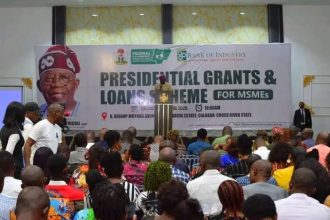The Nigerian government will launch a conditional cash transfer to 15 million households on October 17, 2023, the Minister of Humanitarian Affairs and Poverty Alleviation, Betta Edu, has announced.
Edu made the announcement in an interview on Channels Television on October 8, 2023. She said the ministry is working with stakeholders across the country to get a credible register of beneficiaries.
“As we speak, we are having a verification exercise. Every state can bear us witness that we have put boots on the ground – persons who are working with the state cash transfer office as well as the governors who are the heads of the steering committee and then several other persons,” she said.
“All of this is to be sure those who are on the national social register truly are Nigerians who fall [spend] within the under $1.95 a day [range] and they deserve to have it.”
The minister, who noted that some persons on the register may have died or moved up the economic ladder, said the verification exercise is to clean up the register.
“So, two things. First, as we speak, we are on the field cleaning up that data and doing a complete verification and we are juxtaposing both the BVN, NIM and the rest of it to identify these people and be sure we are dealing with authentic persons,” she said.
“And then, of course, there is biometrics to it and you have a capturing of the head of the household as well as a picture of the household so it can be located.”
The conditional cash transfer program is a social safety net program that provides financial assistance to poor and vulnerable households. The program is conditional on households meeting certain criteria, such as ensuring that their children attend school and receive regular health checkups.
The launch of the conditional cash transfer program to 15 million households is a significant development in Nigeria’s fight against poverty. The program is expected to have a positive impact on the lives of millions of Nigerians, helping them to meet their basic needs and improve their living standards.
The launch of the conditional cash transfer program to 15 million households is a timely one, given the recent rise in the cost of living in Nigeria. The program is expected to provide much-needed relief to poor and vulnerable households, helping them to cope with the high cost of food, transportation, and other essential goods and services.
The program is also expected to have a positive impact on the Nigerian economy as a whole. By increasing the disposable income of poor and vulnerable households, the program is expected to boost consumer spending and stimulate economic growth.
However, some experts have raised concerns about the sustainability of the conditional cash transfer program. The program is funded by the Nigerian government, and it is not clear how long the government will be able to afford to continue funding it.
In addition, some experts have warned that the program could create a dependency culture, with beneficiaries becoming reliant on government handouts rather than working to improve their own circumstances.
Despite these concerns, the launch of the conditional cash transfer program to 15 million households is a positive development for Nigeria. The program has the potential to make a significant difference in the lives of millions of Nigerians, helping them to meet their basic needs and improve their living standards.
The Nigerian government should continue to monitor the program closely and make adjustments as needed to ensure its sustainability and effectiveness. The government should also work to create other opportunities for poor and vulnerable households to improve their circumstances, such as providing them with access to affordable education, training, and employment opportunities. Continue Reading
Source: Vanguard












Mine Pi for free on your phone! I am sending you 1π! Pi is a new digital currency developed by Stanford PhDs, with over 47 million members worldwide. To claim your Pi, follow this link https://minepi.com/yajer72 and use my username (yajer72) as your invitation code.